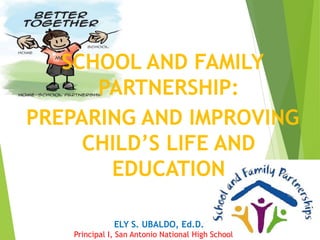
Family School Partnership
- 1. SCHOOL AND FAMILY PARTNERSHIP: PREPARING AND IMPROVING CHILD’S LIFE AND EDUCATION ELY S. UBALDO, Ed.D. Principal I, San Antonio National High School
- 2. School, Family & Community Partnerships
- 3. Families want…. * To feel welcome at school. * To receive more information on how to help their children whenever possible.
- 4. Families want…. * Positive feedback and personalized contact about their children whenever possible. * To be partners in the process of educating children, with timely notification of problems.
- 5. Tips for Schools on How to Involve Families A. Parenting Skills: HELP FAMILIES CREATE HOMES THAT GET CHILDREN READY TO LEARN. 1. Be sure information gets to all families who want or need it, not just the few who can come to meetings at school.
- 6. 2. Enable families to share information with the school about culture, background, children’s talents and needs. Tips for Schools on How to Involve Families A. Parenting Skills: HELP FAMILIES CREATE HOMES THAT GET CHILDREN READY TO LEARN.
- 7. 3. Encourage your school to provide workshops, videotapes on parenting and child rearing and to publicize community programs on nutrition, family literacy and adult education. 4. Find out where to refer parents for family support programs that help with health, nutrition and other services.
- 8. 5. Participate in neighborhood meetings to help families understand schools and to help schools understand families.
- 9. B. Home School-Communication 1. Follow up the parent-teacher conference with regular communications with parents. 2. Consider parents who do not read well and arrange face-to-face meeting with them.
- 10. 3. Every week or every month, send home folders of student work for parents’ review and comment. 4. Have a regular schedule to send home folders of student work for parent’s review and comment.
- 11. 5. Respect parents’ perspective on their child’s abilities and progress. They know their own child in a different setting than you do. 6. Expect to disagree once in a while and embrace the opportunity to see things from a new point of view.
- 12. C. VOLUNTEERING: RECRUIT AND ORGANIZE PARENT HELP SUPPORT 1. Arrange to use parent and community volunteers in your classroom. Recruit widely so that all families know their contributions are welcome. 2. Implement a system of class parents telephone tree, e-mail list, or other way to let volunteers know what’s needed.
- 13. 3. Plan lessons to include help from families at school or from home. 4. Recognize family members for the support they provide.
- 15. What Will School, Family, and Community Partnerships Really DO for Schools? RESULTS OF RESEARCH For Students Higher grades and test scores Increased enrollment in more challenging academic programs
- 16. For Students More classes passed and credits earned Better attendance Improved behavior at home and at school Better social skills and adaptation to school
- 17. What Will School, Family, and Community Partnerships Really DO for Schools? RESULTS OF RESEARCH For Parents • Increased feeling of support from school and other parents • More interactions with other families in school and community activities
- 18. • More effective responses to student problems • Increased awareness of student progress and how to help student do better • Increased feeling of ownership of school
- 19. What Will School, Family, and Community Partnerships Really DO for Schools? RESULTS OF RESEARCH For Teachers • Increased respect for families’ strengths and efforts • Greater readiness to involve ALL families in new ways
- 20. • Increased satisfaction with family involvement and support • More likely to report ALL parents can help their children; less likely to stereotype single parents, poor parents, or those with less education as unable to help
